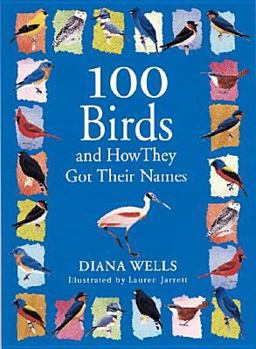100 Birds and How They Got Their Names
How did cranes come to symbolize matrimonial happiness? Why were magpies the only creatures that would not go inside Noah's Ark? Birds and bird imagery are integral parts of our language and culture. With her remarkable ability to dig up curious and captivating facts, Diana Wells hatches a treat for active birders and armchair enthusiasts alike. Meet the intrepid adventurers and naturalists who risked their lives to describe and name...
Format:Hardcover
Language:English
ISBN:156512281X
ISBN13:9781565122819
Release Date:October 2001
Publisher:Algonquin Books
Length:320 Pages
Weight:0.90 lbs.
Dimensions:1.2" x 5.3" x 7.3"
Customer Reviews
5 ratings
Great book, enjoyable reading-quick and simple
Published by Thriftbooks.com User , 18 years ago
It was a great read for someone like me how likes birds, trivial facts, interesting thoughts and needs quick reads. Each section on each bird was only a couple of pages long--about a 1-2 minute read each. Great for relaxing-not alot of scientific lingo to confuse or bore you (thinking really wasn't required). 4 stars.
Fun read but it is not a field guide
Published by Thriftbooks.com User , 19 years ago
Spring is here, and especially in the northern climates, our thoughts begin to focus on the reawakening of nature. Everything that has been at rest comes alive and shouts, "I'm back!" Trees begin to bud, flowers sprout up as we anticipate their glorious colors. And then there are the birds. For many, there is a special anticipation of the birds' return. It is how we know that winter is behind us. While you wait for warmer weather, this wonderful book will not only help time pass more quickly, but will give great pleasure. Diana's Wells' book 100 Birds and How They Got Their Names tells you how birds got their names and provides captivating stories about those 100 birds. Did you know that eagles are among the longest-living birds? Or that the smallest bird in the world is the bee hummingbird? It was fascinating to learn that the same bird in the United States might have a different name somewhere else; or may have the same name, but not be related. A good read for adults but there's information and trivia that will even interest children. If you enjoy nature, this is a personal must-have for your library.
An interesting and informative history of bird names.
Published by Thriftbooks.com User , 21 years ago
There is a wealth of knowledge in this small volume. However, one must be aware of just what this book represents. It is by no means a field guide. If your interests are identifying birds in the field, this book will be of no assistance to you. If however you are the sort of person entertained by word meanings and word origins and are interested in mythological, historical, and Biblical anecdotes this is the perfect book for you as it will offer up several amusing bits of bird trivia. I use the book as an icebreaker in my biology classroom. My students enjoy listening to interesting trivia about birds and are often intrigued by how certain birds actually got their names. Sometimes the taxonomical treatment of birds is cumbersome but overall this is a very readable and entertaining book easily understood by the lay person.
A look into the history of birds and words
Published by Thriftbooks.com User , 22 years ago
Sometimes author Diana Wells gets a little too caught up in the etymology of various birds' Latin names, and then this book reads more like a dry encyclopedia than an affectionate survey of the relationship between some of the sweetest creatures on Earth and human language.Usually, though, Ms. Wells succeeds in vividly tracing the evolution of the layperson's avian terminology. What does the word "titmouse" really mean? She'll tell you. And she takes the reader back into the farthest reaches of history and the roles that some of the most common birds have played in ancient society and even in biblical stories. For example, she explains with facility how nobility used falcons to hunt before guns were invented. She tells of how the starving Israelites, wandering in the wilderness after being freed from Egyptian slavery by Moses, came upon multitudes of quail. Thus, they feasted excessively on the birds until they became sick. The biblical interpretation of this mass indigestion was that the Israelites were punished for being so greedy, but Ms. Wells posits an intriguing secular explanation for what happened. You'll have to read the book to find out what that explanation is.The author also helps the reader to view with tolerance what may be deemed some birds' shocking habits. The shrike impales small animals on walls and fences to eat later... not all that dissimilarly from what one might see in a butcher shop.
fun with bird words
Published by Thriftbooks.com User , 22 years ago
Delightfully literate look at both the origin of bird names (etymology) as well as the common usage of the names. Wells first looks at Greek, Latin, or Egyptian sources for the names. For example, I did not know that Egyptian mummified Ibis, the source of the ibis name. She also calls up stories of early biologists as Linnaeus, Mark Catsby, and Audubon to look at some of the early naming. She relays Audubon's account of wood storks scratching his legs. She also includes both obvious literary references such as Coleridge's albatross in the Rime of the Ancient Mariner and more obscure ones as Hamlet not being able to tell a "hawk from a handsaw" (heron). In a few cases her ornithological information is not precise, for example in discussing "American" prairie chicken she says they "exist further south" (than the Northeast), but further west would be a more accurate description. The illustrations are sometimes not completely accurate, as the depiction of the thick upturned bill of the avocet. For anyone who has wondered at such names as "goatsucker" this is a good readable, source.






